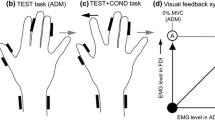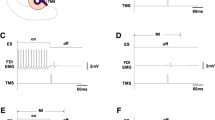Abstract
Interhemispheric inhibition between motor cortices is reduced in musicians. In the present study we have assessed intracortical inhibition (ICI) and facilitation (ICF) within ipsilateral motor cortex in 15 musicians and 15 non-musician controls. Transcranial magnetic stimulation (TMS) was used to elicit muscle evoked potentials (MEPs) from left first dorsal interosseous (FDI) muscle at rest, and during voluntary index finger abduction (0.5 N). Paired TMS with subthreshold conditioning was used to test early ICI with interstimulus intervals (ISIs) 1–5 ms, and ICF with ISIs 8–15 ms. Suprathreshold conditioning was used to test late ICI with ISIs 100–200 ms. TMS thresholds were similar in musicians and controls both at rest and with weak voluntary activation of FDI, indicating that postsynaptic excitability of corticospinal neurons was similar in both groups. ICI was less effective in musicians with FDI at rest and active, but only with an ISI of 3 ms. ICF was less effective in musicians under both rest and active conditions, and this was independent of ISI. There were no differences in late ICI between musicians and controls. We conclude that ICI and ICF circuits which are activated by weak TMS have less influence on corticospinal neuron excitability in musicians. Because of the dependence on ISI, the most likely explanation for the reduced ICI in musicians is an alteration of the interaction between the ICI circuit and neural elements responsible for the later I-waves evoked in corticospinal neurons by TMS. Excitability of the neural elements producing early and late ICI is not altered in musicians. Reduced ICF in musicians could be due to reduced excitability of neurons responsible for ICF, or an altered balance of excitatory inputs to corticospinal neurons which favours neurons that are not acted upon by the ICF circuit. The reduced influence of ICI and ICF circuits on corticospinal neuron excitability in musicians is likely to reflect a training-induced adaptation. It is not clear at present whether these differences represent an adaptive change related to their extraordinary control of finger movements, or alternatively a maladaptive change induced by “overuse” of the hands from extensive training.
Similar content being viewed by others
Author information
Authors and Affiliations
Corresponding author
Rights and permissions
About this article
Cite this article
Nordstrom, M.A., Butler, S.L. Reduced intracortical inhibition and facilitation of corticospinal neurons in musicians. Exp Brain Res 144, 336–342 (2002). https://doi.org/10.1007/s00221-002-1051-7
Received:
Accepted:
Published:
Issue Date:
DOI: https://doi.org/10.1007/s00221-002-1051-7




